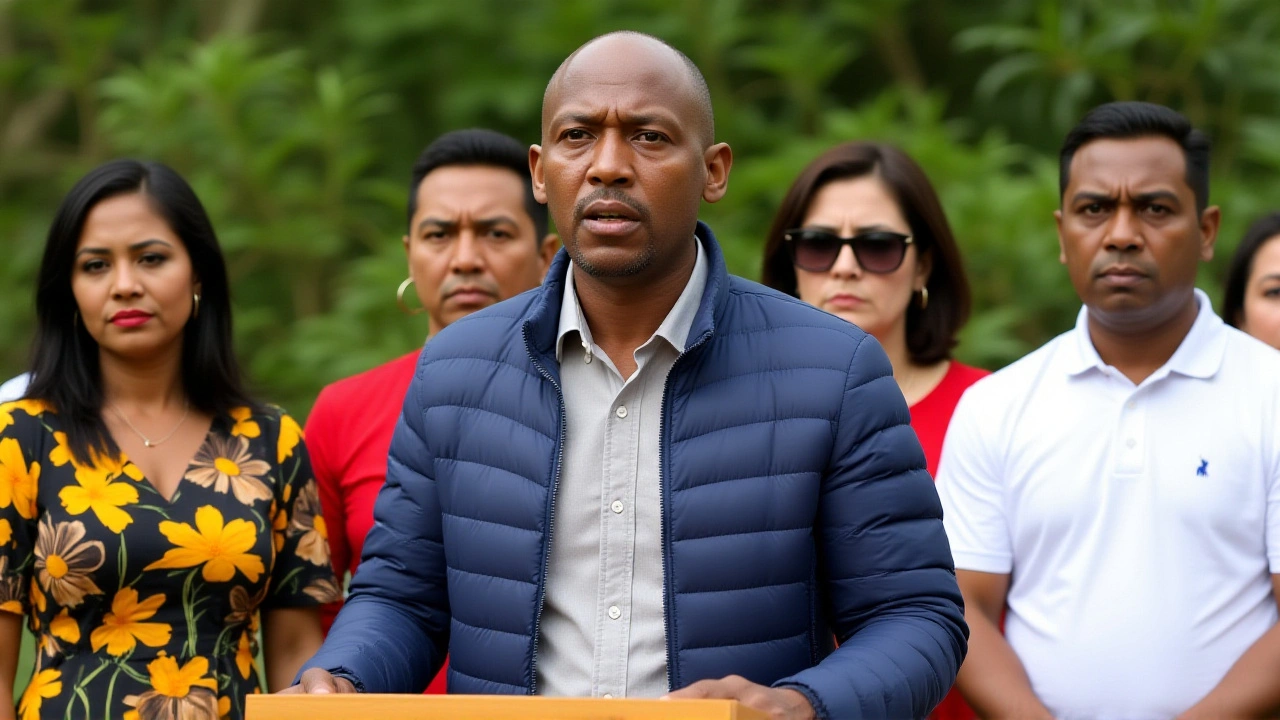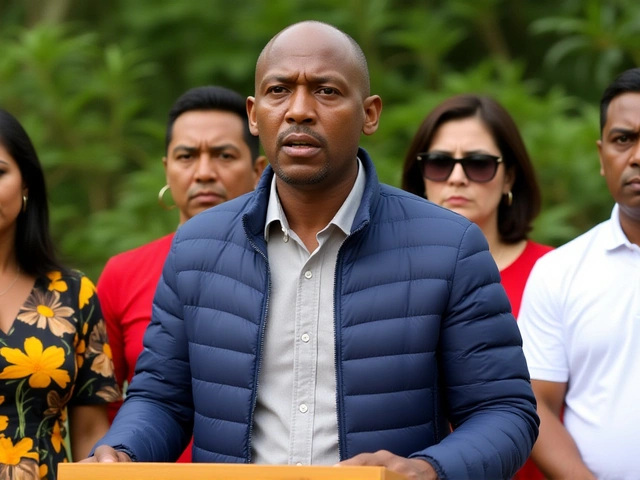When Vincent Kawaya, Member of Parliament for Mwala and United Democratic Alliance publicly called for the resignation of Mutahi Kahiga, Governor of Nyeri County on October 22, 2025, the nation’s social media lit up. The spark? A comment made at a burial in Kiganjo, where Kahiga said former Prime Minister Raila Odinga’s hypothetical death would be a “blessing” for the Mount Kenya region. The backlash was swift, crossing party lines and prompting the Council of Governors to strip him of his vice‑chairmanship just hours later.
Background of the Controversial Remark
Kahiga, a United Democratic Alliance (UDA) stalwart who won the Nyeri gubernatorial seat on August 9, 2022, delivered the remark during a traditional funeral ceremony in his home village. Speaking in Kikuyu, he said that the passing of Odinga would be a "blessing" for the people of the Mount Kenya area. The comment, though delivered in a private setting, was recorded on a by‑stander’s phone and went viral on X, Facebook, and WhatsApp within minutes. By midday, the hashtag #KahigaResign had trended nationally for over six hours.
While Kahiga later claimed he was not celebrating any death, his apology on the same day acknowledged the “public outrage” his words caused. He insisted the statement was taken out of context, but the damage was already done.
Political Reactions Across the Spectrum
Beyond Kawaya’s demand, leaders from the Orange Democratic Movement (ODM) and even some UDA allies condemned the comment as reckless. Kalonzo Musyoka, head of the Wiper Democratic Movement, was warned by Kawaya that “the politics of hate have no place in the new Kenya we are building.”
Even William Ruto, Kenya’s President, urged calm, stating that political discourse should never “fuel ethnic tension.” Meanwhile, civil society groups called for a swift investigation, fearing the comment could reignite historic divisions between the Kikuyu and Luo communities.
Legal and Institutional Response
The National Cohesion and Integration Commission (NCIC) received an official request from Kawaya to launch an inquiry. Under the National Cohesion and Integration Act of 2008, the commission can prosecute hate speech that endangers national unity. The NCIC’s head, Dr. Ng'ang'a, confirmed a team would be dispatched to Nyeri within 24 hours.
In parallel, the Council of Governors voted unanimously to accept Kahiga’s resignation as vice‑chair, though he remains governor pending further action. The council’s spokesperson said the move was meant to “preserve the integrity of the institution and restore public confidence.”
Implications for Kenya’s Ethnic Harmony
The episode underscores how a single off‑hand remark can ripple through Kenya’s delicate ethno‑political landscape. Analysts point to the 2007‑08 post‑election violence as a cautionary tale, noting that language that pits one community against another can quickly become a catalyst for unrest.
Researchers at the University of Nairobi’s Institute of Governance argue that the incident could embolden opposition forces to press for stricter hate‑speech legislation, while also pushing the ruling UDA to tighten internal discipline. The fear is that without decisive action, other regional leaders might feel empowered to make similarly incendiary statements.
What’s Next for Nyeri’s Leadership?
With his vice‑chair role gone, Kahiga faces mounting pressure from both his party and civil society to step down completely. If he refuses, the NCIC could recommend a court‑ordered removal under the Constitution’s provisions for misconduct. A special election could be called, but that would leave Nyeri County without a stable leader during a crucial development period.
Meanwhile, Kawaya has signaled that the UDA’s national executive will convene by the end of the week to decide on possible sanctions against Kahiga. Sources close to the party suggest a possible suspension pending a formal ethics hearing.
Frequently Asked Questions
How does this affect the residents of Nyeri County?
Nyeri voters now face uncertainty about who will steer development projects and public services. If Kahiga steps down, a caretaker or interim governor may be appointed, potentially delaying infrastructure plans already in motion.
What triggered the NCIC’s involvement?
Vincent Kawaya formally asked the commission to investigate, citing the remark’s potential to incite ethnic tension. Under the 2008 Act, the NCIC can prosecute hate speech that threatens national cohesion.
Could this lead to new hate‑speech legislation?
Political analysts say the incident may revive calls for tighter laws. Lawmakers from both the ruling UDA and opposition ODM have hinted at reviewing the 2008 Act to include clearer penalties.
What role did President William Ruto play?
President Ruto urged calm and called for unity, emphasizing that political discourse must not fuel division. He has not intervened directly but his administration will monitor the NCIC’s findings.
Is there a precedent for a governor’s forced resignation in Kenya?
Yes. In 2019, the Governor of Mombasa stepped down after a corruption scandal that led to a court‑ordered removal. The Kahiga case could become another landmark for accountability at the county level.



Kawaya is right, a leader who says a thing like that should step down now. We can’t let hate speech slide, especially from someone who represents us. This is about respect for all Kenyans.
The uproar over Governor Kahiga’s “blessing” remark is a stark reminder of how fragile Kenya’s ethnic fabric can be.
While he tried to argue that his words were taken out of context, many citizens felt that no leader should wish death upon a political opponent.
The fact that this comment was made at a funeral only amplified the sense of disrespect.
In a country still healing from the scars of the 2007‑08 violence, such statements can quickly reignite old wounds.
It is encouraging, however, to see politicians from different parties, even those within the UDA, publicly condemn the remark.
This shows a growing consensus that hate speech will not be tolerated, regardless of party loyalties.
The Council of Governors’ decision to strip Kahiga of his vice‑chairmanship was a swift and necessary move.
It sends a clear signal that institutional bodies are willing to act when the public outcry reaches a tipping point.
At the same time, the involvement of the NCIC adds a legal layer that could set a precedent for future cases.
If the commission recommends a court‑ordered removal, it could reinforce the principle that public officials are accountable for their words.
Some observers worry that the backlash might be used by political rivals to weaken the UDA ahead of upcoming elections.
Nevertheless, the larger conversation is about building a culture where leaders speak responsibly.
Educational initiatives on hate speech and its consequences could help prevent similar incidents.
Community leaders and civil society groups play a crucial role in fostering dialogue that bridges ethnic divides.
Ultimately, the hope is that this episode becomes a learning moment rather than a source of further division.
We should all keep pushing for a Kenya where political rivalry is expressed through ideas, not through threats to lives.
Kahiga’s comment really hurt a lot of people and the backlash shows how sensitive these issues are.
The governor’s words have clearly crossed a line that many in Nyeri cannot ignore.
It’s not just about politics; it’s about the hurt that such statements cause to families and communities.
Leaders need to remember that their platform comes with responsibility.
We should demand accountability while also supporting constructive dialogue.
From a policy perspective, the NCIC’s involvement could strengthen Kenya’s legal framework against hate speech.
However, enforcement must be transparent to avoid perceptions of partisan bias.
It would also be prudent for the UDA to review its internal codes of conduct to prevent future lapses.
Community outreach programs can help bridge the divide that such remarks exacerbate.
Overall, a balanced approach that safeguards free expression while curbing incitement is essential.
These words cut deeper than any sword.
I get where the anger is coming from, but let’s also think about how quickly these moments can spiral into bigger chaos :) We need measured responses, not just hot‑head reactions.
Honestly, this is the kind of reckless talk that puts our nation’s image on the line.
If we let it slide, it sets a dangerous precedent for every politician.
Let’s channel this energy into constructive civic engagement.
Volunteering with local peace‑building groups can help turn the tide of negativity.
Every positive action, no matter how small, contributes to national cohesion.
Every challenge is an opportunity for growth.
If we treat this as a lesson, future leaders may think twice before speaking carelessly.
Optimism can coexist with accountability.
Look, we all want Kenya to move forward without this kind of drama.
Let’s keep the conversation respectful and focus on what actually helps our communities.
In light of the recent events, it is imperative, therefore, that all stakeholders, including civil society, political parties, and the media, collaborate, coordinate, and communicate effectively; this coordinated approach will ensure that the principles of unity, accountability, and transparency are upheld across the board.
The incident underscores a systemic vulnerability in our political discourse architecture, where incendiary rhetoric can propagate through digital amplification vectors, thereby destabilizing the sociopolitical equilibrium.
Strategic mitigation frameworks, incorporating both regulatory oversight and stakeholder education, are essential to fortify institutional resilience.
What they don’t tell you is how many behind‑the‑scenes players may be pulling strings to exploit this for their own gain.
This kind of rhetoric can easily become a catalyst for broader unrest if not addressed promptly.
We need a clear, measured response from both the government and civil society to prevent escalation.
Sure, but isn’t it also possible that the whole uproar is being blown out of proportion? 🤔